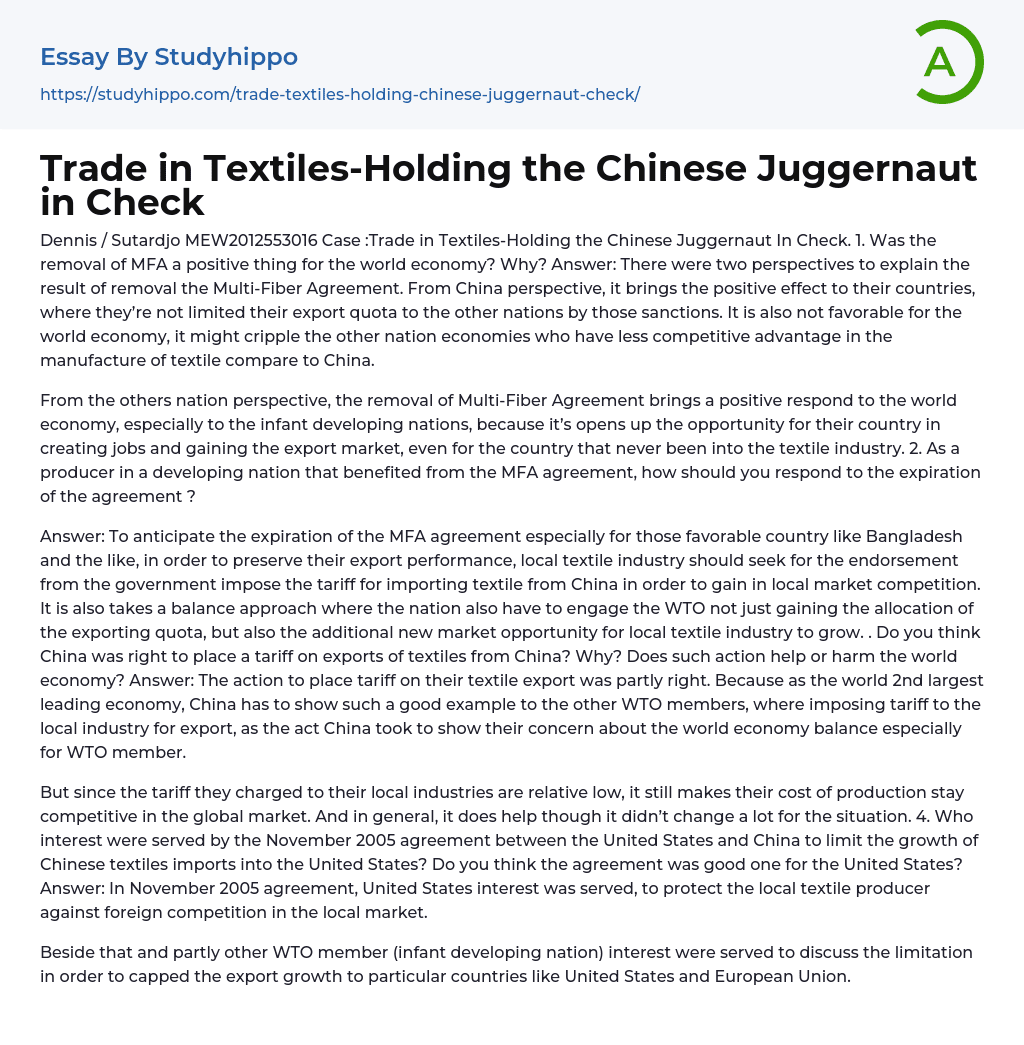

Trade in Textiles-Holding the Chinese Juggernaut in Check Essay Example
Case: Trade in Textiles-Holding the Chinese Juggernaut In Check.
1. Was the removal of MFA a positive thing for the world economy? Why?
Answer: There were two perspectives to explain the result of removal the Multi-Fiber Agreement. From China perspective, it brings the positive effect to their countries, where they’re not limited their export quota to the other nations by those sanctions. It is also not favorable for the world economy, it might cripple the other nation economies who have less competitive advantage in the manufacture of textile compare to China.
From the others nation perspective, the removal of Multi-Fiber Agreement brings a positive respond to the world economy, especially to the infant developing nations, because it’s opens up the opportunity for their country in creating job
...s and gaining the export market, even for the country that never been into the textile industry.
2. As a producer in a developing nation that benefited from the MFA agreement, how should you respond to the expiration of the agreement?
Answer: To anticipate the expiration of the MFA agreement especially for those favorable country like Bangladesh and the like, in order to preserve their export performance, local textile industry should seek for the endorsement from the government impose the tariff for importing textile from China in order to gain in local market competition. It is also takes a balance approach where the nation also have to engage the WTO not just gaining the allocation of the exporting quota, but also the additional new market opportunity for local textile industry to grow.
3. Do you think China was right to place
a tariff on exports of textiles from China? Why? Does such action help or harm the world economy?
Answer: The action to place tariff on their textile export was partly right. Because as the world 2nd largest leading economy, China has to show such a good example to the other WTO members, where imposing tariff to the local industry for export, as the act China took to show their concern about the world economy balance especially for WTO member. But since the tariff they charged to their local industries are relative low, it still makes their cost of production stay competitive in the global market. And in general, it does help though it didn’t change a lot for the situation.
4. Who interest were served by the November 2005 agreement between the United States and China to limit the growth of Chinese textiles imports into the United States? Do you think the agreement was good one for the United States?
Answer: In November 2005 agreement, United States interest was served, to protect the local textile producer against foreign competition in the local market.
Beside that and partly other WTO member (infant developing nation) interest were served to discuss the limitation in order to capped the export growth to particular countries like United States and European Union. This agreement wasn’t good for United States, where they might displacing the local demand with import from the other countries except China which has less competitive advantages in manufacture of textile that wound up in higher prices for American consumer to purchase the textile products.
5. What kind of trade barrier was erected by
the November 2005 agreement between China and United States?
Answer: The trade barrier erected in November 2005 agreement between United States and China was Voluntary Export Restrain, where they reached in an agreement to capped the growth in Chinese textile import to United States around 15% per annum through until 2008.
- Bangladesh essays
- China essays
- Hong Kong essays
- India essays
- Japan essays
- Kuala Lumpur essays
- Malaysia essays
- Manila essays
- Pakistan essays
- Philippines essays
- Singapore essays
- Vietnam essays
- Vietnamese essays
- African American essays
- African American Culture essays
- American Values essays
- Asian American essays
- Chinese essays
- Ethnicity essays
- Ethnocentrism essays
- German essays
- Han Chinese essays
- Hispanic essays
- Identity essays
- Korean essays
- Mexican essays
- Nation essays
- Native American essays
- Race and Ethnicity essays
- White People essays
- American Dream essays
- Barriers To Entry essays
- Capitalism essays
- Central Bank essays
- Compensation essays
- Consumerism essays
- Economic Development essays
- Economic Growth essays
- Economic Inequality essays
- Economic System essays
- Economy essays
- Employment essays
- Export essays
- Finance essays
- Free Trade essays
- Gross Domestic Product essays
- Human Development essays
- Income Inequality essays
- Industry essays
- Inflation essays



